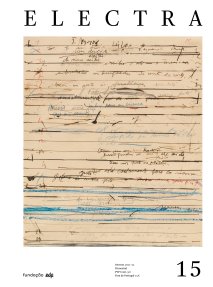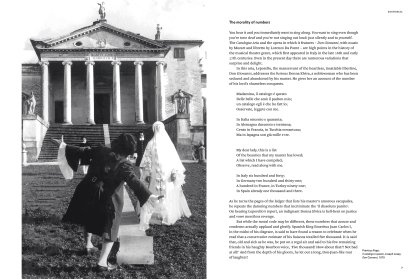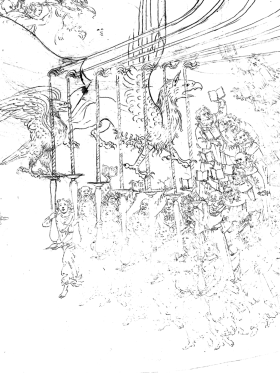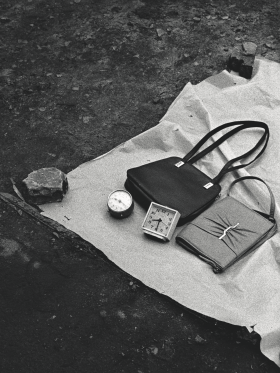In this aria, Leporello, the manservant of the heartless, insatiable libertine, Don Giovanni, addresses the furious Donna Elvira, a noblewoman who has been seduced and abandoned by his master. He gives her an account of the number of his lord’s shameless conquests.
You hear it and you immediately want to sing along. You want to sing even though you’re tone deaf and you’re not singing out loud: just silently and to yourself. The Catalogue Aria and the opera in which it features – Don Giovanni, with music by Mozart and libretto by Lorenzo Da Ponte – are high points in the history of the musical theatre genre, which first appeared in Italy in the late 16th and early 17th centuries. Even in the present day there are numerous variations that surprise and delight.

il catalogo è questo, Joseph Losey, Don Giovanni, 1979
Madamina, il catalogo è questo Delle belle che amò il padron mio; Un catalogo egli è che ho fatt'io; Osservate, leggete con me.
In Italia seicento e quaranta; In Alemagna duecento e trentuna; Cento in Francia, in Turchia novantuna; Ma in Ispagna son già mille e tre.
My dear lady, this is a list Of the beauties that my master has loved; A list which I have compiled; Observe, read along with me.
In Italy six hundred and forty; In Germany two hundred and thirty-one; A hundred in France, in Turkey ninety-one; In Spain already one thousand and three.
As he turns the pages of the ledger that lists his master’s amorous escapades, he repeats the damning numbers that incriminate the ‘il dissoluto punito’. On hearing Leporello’s report, an indignant Donna Elvira is hell-bent on justice and vows merciless revenge.
But while the moral code may be different, these numbers that accuse and condemn actually applaud and glorify. Spanish King Emeritus Juan Carlos I, in the midst of his disgrace, is said to have found a reason to celebrate when he read that a conservative estimate of his liaisons totalled five thousand. It is said that, old and sick as he was, he put on a regal air and said to his few remaining friends in his haughty Bourbon voice, ‘Five thousand! How about that?! Not bad at all!’ And from the depth of his gloom, he let out a long, Don-Juan-like roar of laughter!
We know that, when Lorenzo Da Ponte was writing the libretto for this opera, he was inspired by the ebullient, extravagant Giacomo Casanova. Casanova, who had heard about the project, suggested a few changes to the librettist, who took them on board. Later, when the memoires of the relentless Venetian seducer, swashbuckler and writer – The Story of My Life – were published, they also contained a detailed list of his amorous conquests (and failures), which holds its own with Leporello’s catalogue of Don Giovanni’s famous successes.
There has always been a connection between numbers and morals. Numbers judge, decide and sentence. Holy books, moral treatises, esoteric cryptographies, hermetic symbols, legal codes, military regulations, labour laws, disciplinary rules, marks for deportment and prison notifications assign numbers to words that quantify them and make them more performative and mensurable. These are the numbers that measure crime and punishment. They are the numbers that reduce or increase them.
Pythagoras said, ‘Number rules the universe.’ He added, ‘All things are number.’ From the Books of Genesis and Numbers in the Torah to Kabbalah, from Pythagoras to Wittgenstein, from Plato to C. S. Peirce, from Aristotle to St Thomas Aquinas, from Descartes to Bertrand Russell, from Pascal to Leibniz, from Espinosa to Frege, from the Chinese ideographic numeral system to Indo‑ -Arabic algorisms, from the number of gold to the Aztec calendar, numbers are another code, another language, another face, another universe.
They are at the centre of an ever-growing circle. They are clarity and enigma. They are concepts, symbols and operators. They are natural, digital, whole, fractions, complex, rational, irrational, real, imaginary, prime, even, odd, positive, negative, countable and computable. They are weight, sum, measure, order, judgement, proof, demonstration, reality, imagination, construction, rule, estimate, possibility, probability and forecast. They are science, philosophy, technology, art, literature, politics, medicine, economics, history, sociology, anthropology, semiotics and sexology.
According to a philosophical path with which Heidegger was not unfamiliar, it is in the light of the fundamental distinction between name and number that the history of Western thought shows us the growing subordination of name to number and concealment, contempt and even depreciation of everything that is incalculable.
This means the subordination of verbal, poetic, ontological, meditative and qualitative thought to numeric, calculating, pragmatic, utilitarian and quantitative thought, which imposes the physical thought of being and having on the metaphysical thought of existing and being.
For those who defend this theory, these have been the grounds for the formation of Western rationality since the start of the Modern Age. The methods and purpose of this rationality represent a reduction in what is countable and calculable, from the universe to the human being, from subject to object, and from spiritual life to material life. Heidegger believed that this was what explained how the indifferent, mechanical noise of machines muted the voices of the gods, whose present absence Hölderlin still sought to hear in the world.
For Heidegger, man became the subject in the Modern Age, and the world became the picture. In his essay ‘The Age of the World Picture’ (Off the Beaten Track), he said, ‘Numbers are more obvious than ever before’. He commented on the equivocal relationship of accuracy with inaccuracy and spoke of a clash of worldviews, saying, ‘For this battle of worldviews and, because of the purpose of this battle, man is jeopardising the unlimited violence of calculus, planning and selective cultivation’1.
If this was the case, it became even more so in the dawn of the Age of Technology. In the competitive, global, digital age in which we live, numbers have taken over like never before and are now the measure of everything. We are living under the rule of numerical morality. Under this rule – to use Espinosa’s ideas, numbers are not just attributes (or accidents, as Aristotle would say) of morality; they are actually their substance. Everything is quantified, counted, measured, weighed, computed, numbered, ordered, categorised and catalogued to create goals, targets, evaluations, judgements, choices, breakdowns, impositions and verdicts. And also to generate guilt or acquittal, good or bad faith, permission or censure, automatism and self-control, subordination and identification, differentiation and inequality.
We are surrounded by numbers (both cardinal and ordinal). We spend our lives producing reports, statistics, polls, surveys, rankings, ratings, tops, templates, scales, algorithms, graphs, formulas, models, matrices, averages, controls, and monitoring. Every word, every action, every gesture is governed, recorded and assessed by some kind of number in some sort of numerical code. Numbers are also the stars of today’s ‘spectacle society’ (political, communicational, cultural, economic, financial and social), having moved from the prompter’s box to centre stage. And they are also a new creed, even a new determinism.
Mallarmé once said that everything that existed in the world was made to end up in the pages of a book. We might say today that everything that exists in the world is designed to end up on Excel spreadsheets. Ancient and modern nominalists now have some new successors: numerists.
Added to this trend of technical, scientific, digital, numerical rationality there has been universal financialisation, which has reversed the law valuing quality over quantity postulated by dialectic materialism. The rule now is that for quality to be considered quality, it must become quantity. And price is often the only value.
Oscar Wilde, with his sharp insight and astutely prophetic humour, once wrote that a cynic knows the price of everything and the value of nothing. And he also pointed out that ‘Young people, nowadays, imagine that money is everything. [...] And when they grow older they know it.’
There is no need to demonise or divinise numbers. Indeed, as Fernando Pessoa / Álvaro de Campos wrote:

Newton’s binomial is as beautiful as Venus de Milo. The problem is that not many people have noticed.
óóóó — óóóóóóóóó — óóóóóóóóóóóóóóó2
(The wind outside)
We need to do to numbers what they want to do to us: question them, examine them, decipher them, analyse them, interpret them, contextualise them, assess them and even psychoanalyse them. And to find out when and how they are used, what they are used for and with what legitimacy or illegitimacy.
In this issue of Electra 15 (yet another number!), we question numbers and their omnipresence, omnipotence and omniscience (all of which are divine attributes), to find out how they have taken power and re-founded and reinstated it, repeating, but with profane fury, what Pythagoras declared as a sacred principle 27 centuries ago: ‘Number rules the universe’.
We question numbers and what they show and hide, what they confirm and falsify, what they represent and how they are used today to configure our times and our world, creating our light and darkness, our work and leisure, our truths and lies, our good and evil, our successes and failures, our wealth and poverty, our health and sickness (covid-19 is a numerical pandemic), our life and death.
Perhaps a future Michel Foucault will write a book that instead of being called Les Mots et les Choses [The Order of Things], will be entitled ‘Numbers and Things’ and will look into the contemporary episteme and foundations on which the edifice of our thoughts and actions is built, in a world believed to be globalised.
In addition to the theme of Numbers, the other sections in this issue address a variety of subjects (philosophy, science, art, design, photography, urbanism, literature). In times of specialised knowledge and tightly closed borders, they point to the need for dialogue, fluctuations, opening, flexibility, escape and links between specialist areas and established disciplines.
Leporello continues to recount and sing Don Giovanni’s sins (or virtuous triumphs). From Cervantes to Byron, from Molière to Pushkin, from Carlo Goldoni to Balzac, from Tirso de Molina to E. T. A. Hoffmann, from Alexandre Dumas to Baudelaire, from Giuseppe Gazzaniga and Giovanni Bertati to Mozart and Lorenzo Da Ponte, from Franz Liszt to Richard Strauss, from Søren Kierkegaard to George Bernard Shaw, from José Bergamín to Ortega y Gasset, from Ramón María del Valle-Inclán to Marina Tsvetaeva, from Max Frisch to Almeida Faria, from Gregorio Marañón to José Saramago, from Joseph Losey to Carlos Saura, the figure of Don Giovanni has become a universal, timeless myth and has been resumed, recreated, rewritten and reinterpreted in the most ingenious and imaginative (and sometimes quite delightful) ways.
At the end of Mozart and Lorenzo Da Ponte’s dramma giocoso, the hero- ‑anti-hero seducer does not repent, back down or ask for mercy, even when faced with the hellish punishment of being consumed by flames as hot and fiery as sensual love.
Perhaps at this dramatic, decisive moment, Don Giovanni gave some thought to the list that Leporello had so resentfully and covetously reeled off to Donna Elvira and so endlessly detailed to us. When faced with this unexpected numerical catalogue of his deeds, perhaps he continued to feel not shame, perdition or condemnation, but rather, pride, salvation and absolution.
At the end of this brilliant opera by Mozart and Da Ponte, the chorus sings with moralistic, sententious fervour:
E de’ perfidi la morte Alla vita è sempre ugual!
And in this life scoundrels Always receive their just deserts!
It could be that, even without knowing, these voices tuned by the morality of numbers actually give Don Giovanni a reason for another morality – one that gives numbers a greater awareness of their illusory precision.





Share article